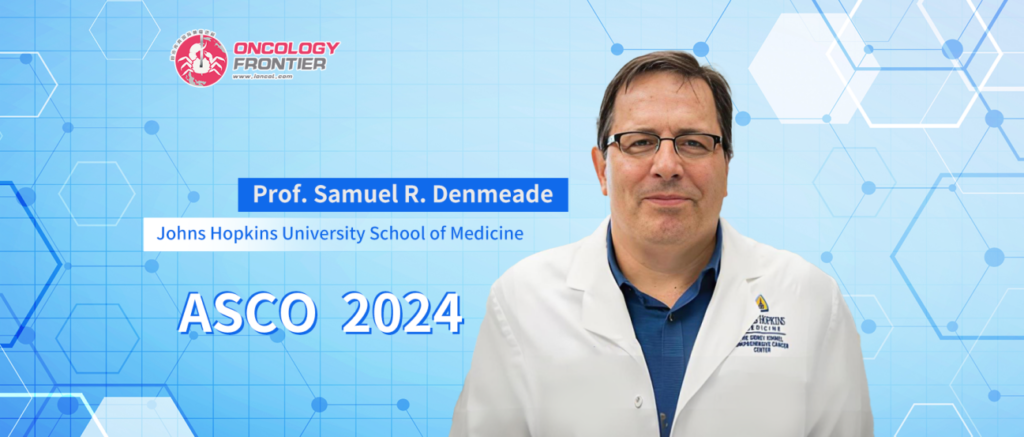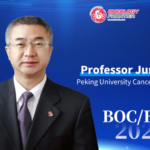
Editor's Note: The 2024 American Society of Clinical Oncology (ASCO) Annual Meeting concluded successfully. In a recent late-breaking abstract (LBA) report, Professor Samuel R. Denmeade from Johns Hopkins University School of Medicine shared the specific results of the TRANSFORMER trial. This randomized trial targeted abiraterone-pretreated metastatic castration-resistant prostate cancer (mCRPC) patients, aiming to identify blood biomarkers. "Oncology Frontier" had the opportunity to interview Professor Samuel R. Denmeade to highlight the potential benefits and future directions of bipolar androgen therapy (BAT), a new treatment approach.
1. Unmet Treatment Needs for mCRPC
Oncology Frontier: What unmet treatment needs do you think exist for mCRPC patients?
Dr. Samuel R. Denmeade: The treatment of prostate cancer when it becomes castrate-resistant is complex, and the best sequence of treatments is not entirely clear. Initially, we often use hormone therapy, which can be effective for a short period in about two-thirds of patients. However, subsequent treatments tend to be non-hormonal and more toxic, such as chemotherapy and radiation therapies. The significant unmet need is to develop treatments that can prolong the hormone-sensitive phase of prostate cancer and avoid more toxic treatments. This is where our research on bipolar androgen therapy comes in.
Prolonging exposure to low hormone levels makes the cancer adapt by increasing the hormone receptor, paradoxically making it sensitive to high testosterone. While it may seem counterintuitive to give testosterone, as most treatments aim to block it, we found that a significant number of men respond well to this treatment. They generally feel stronger and have more energy, and the cancer becomes re-sensitized to hormone-blocking treatments. We’re exploring a strategy of alternating low and high hormone levels to avoid the need for chemotherapy. We have treated about 300 to 400 patients in the U.S., and it appears to be safe with a good response rate. Many patients show re-sensitization to hormone-blocking treatments, and it’s also an inexpensive treatment. We’re excited about its potential as a standard treatment.
2. Identifying Effective Patients for BAT
Oncology Frontier: Can blood-based markers be used to identify patients who are effectively treated with bipolar androgen therapy?
Dr. Samuel R. Denmeade: In our studies, we found that patients with high levels of the androgen receptor tend to respond better. Instead of invasive biopsies, we’re exploring measuring the receptor levels in the blood using circulating tumor DNA. High levels of the androgen receptor correlate with better responses to the therapy. Ideally, a patient with resistant prostate cancer would have their blood drawn to check for this marker. If the marker is high, we would consider bipolar androgen therapy. If it’s low, we might continue with standard hormone treatment. This could help tailor treatment decisions and improve outcomes.
3. Clinical Implications and Application
Oncology Frontier: What are the implications of these findings for the treatment of prostate cancer? How should they be applied in clinical practice?
Dr. Samuel R. Denmeade: We aim to establish this as a standard treatment. Future research will focus on integrating new modalities, such as bispecific antibodies, antibody-drug conjugates, and new cellular therapies, with bipolar androgen therapy to further enhance patient outcomes. We hope the marker will help us identify patients most likely to benefit from this treatment, making it more effective and personalized.

- Johns Hopkins University School of Medicine
- Director of Genitourinary Oncology
- Professor of Oncology
Professor Samuel Denmeade is a Professor of Oncology and Urology at Johns Hopkins University School of Medicine and the Director of Genitourinary Oncology at the Johns Hopkins Kimmel Cancer Center. He also holds positions in the Departments of Pharmacology and Molecular Sciences and Biomedical Engineering. His clinical expertise includes bladder cancer, kidney cancer, prostate cancer, and testicular cancer. His research interests focus on prostate cancer, bipolar androgen therapy, clinical trials, and targeted drug development.
Professor Denmeade has published over 200 papers in the field of prostate cancer research. He has received substantial funding from the National Institutes of Health, the Department of Defense Prostate Cancer Research Program, and the Prostate Cancer Foundation. He is also the editor-in-chief of the medical journal “The Prostate.”


